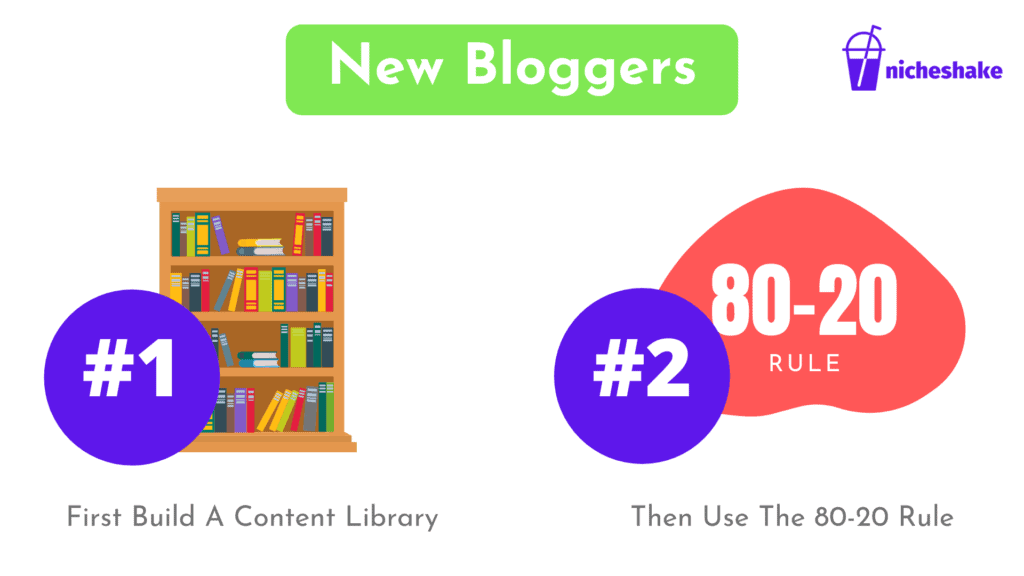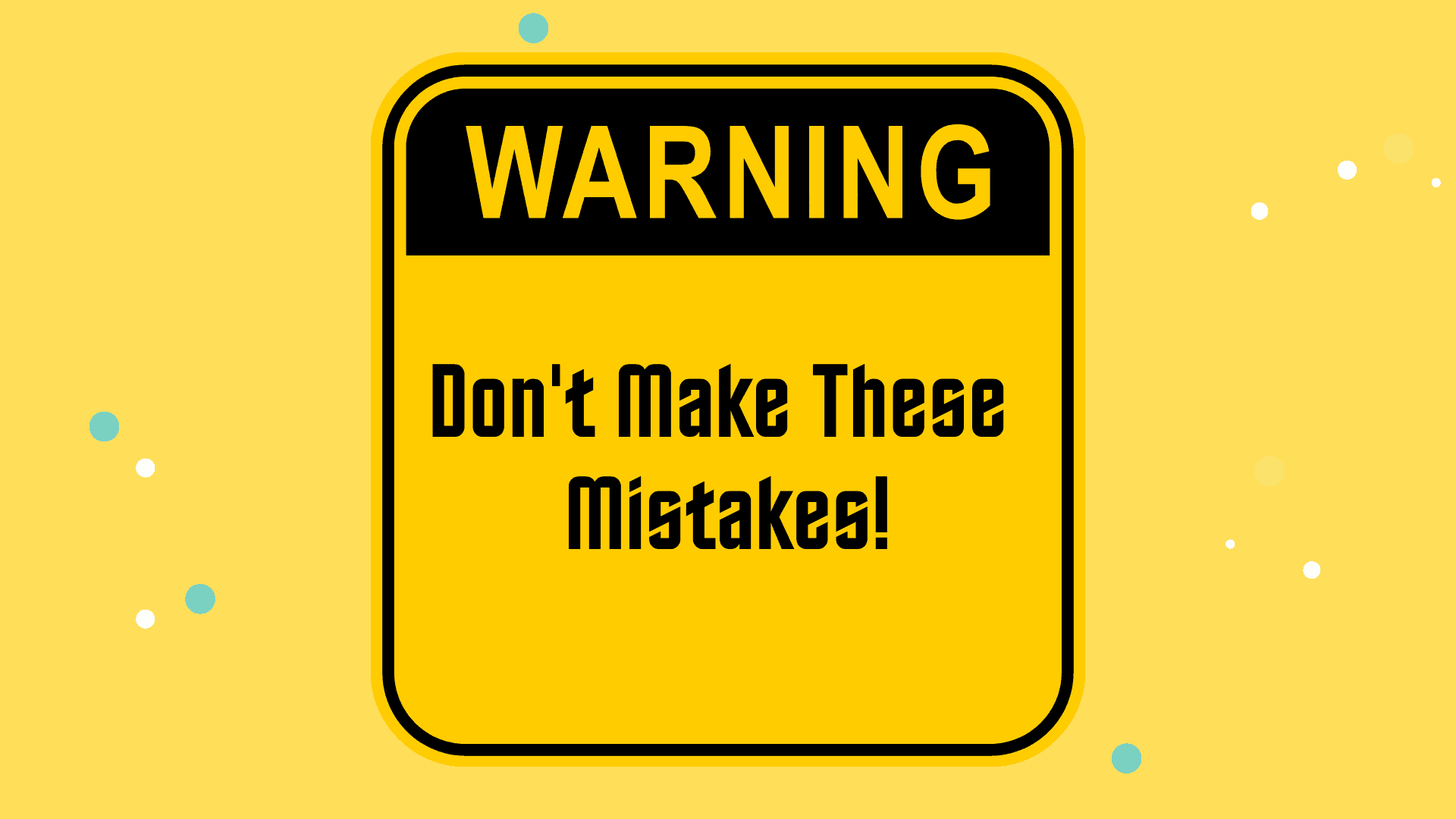90.63% content on the internet gets zero to no traffic from google organic search.
Are you one of the 9.37% or not? Will you ever get traffic? Are you implementing all the non-working strategies & tactics?
Do those questions keep you awake at night? They sure did keep us at a point back in time.
And to be honest, these questions helped us rectify and learn from our mistakes. Also, the majority of our readers are first time website owners and bloggers.
So as to help them we decided to create a post that would put together our top picks for the most common and stupid blogging mistakes we ourselves have made over the years.
Let’s dive in,
Jump To...
#1 Epic Post = Long Post
Mistake:
Let’s be honest. Everybody out there just tells you to publish epic or skyscraper content which basically means slamming 2000 words more in your content than the current ranking results.
In fact, according to a study by Backlinko, Long-form content correlates very well with higher link acquisition.
But first let us summarize, what is the perception of “High Quality Content” for newbie bloggers.
- Super Lonnnnnng (3000+ word piece of content)
- Excellent Content UX
- Everybody wants to link to it
- If my content is not epic it would be completely useless
The truth is;
Most of the time people just use the Word count metric to justify whether a piece is of high quality or not. And this is also true that a longer word count is a by-product of a thorough and detailed article.
But not every one of your articles can have 3000 words in it.
For example, you have a site on VPNs. Now you can create a 3000 word piece for a piece of content like the best VPNs but you can’t do the same thing for an article like “How to fix VPN connectivity issues?”.
Word count alone doesn’t contribute to high-quality content. In a Whiteboard Friday, Rand Fishkin debunked it.
Solution:
The most important thing when you do any forms of marketing is your audience or in this case your reader.
Try and make your content as reader friendly and appealing as possible.
For example, in our article about Trust flow & Citation flow, all of our competitors explain the concept of Trust flow and Citation flow with a bunch of super wordy paragraphs.
Which in our point of view confuses someone who doesn’t know a thing about them.
That’s why to give our content a more high quality appeal, we decided to embed a slideshare which explains the concept of Trust flow and citation flow visually.
Similar to that you also need to come up with creative ideas which separate your content from others without necessarily increasing the word count.
#2 Traffic Assets? I Got Google
Mistake:
A lot of times bloggers just fade into the world of SEO. That is, they consider SEO as their ultimate goal. Everything else is subsidiary.
And that’s one of the stupidest blogging mistakes you can make. What happens if someday you get hit by a Google algorithm update. Years of SEO straight down the drain.
That’s why you need to build Traffic Assets.
TrafficAssests are sources of traffic on which you have complete or 100% control. That would be private member groups, discord servers, forums or even your mail list.
But for most blogs, the majority of traffic would still be from organic search. I.e, don’t give up on Google.

Just make sure you have a Google doomsday backup.
Solution:
Try to convert as many first time or new users to returning users or members whom you can contact and drive to your website anytime you want.
Here’s a table compiling the platforms or tools you would need to build a trafficasset.
🎯 Links
#3 Scrambling Random Articles
Mistake:
Often bloggers justify revenue with more & more pieces of content. Which is not true at all (unless you have a big team for content production).
People pick a niche, say “Football” and then start writing random articles about it. And this doesn’t help Google at all.
You see, when Google sees random articles being published on your blog it won’t be able to understand what your blog is about and as a result will not rank you either.
Solution:
We will again use our previous example of Football. To begin with you should start writing content about the equipment then go on to skill tutorials (with videos of course) then news and so on and so forth.
This will give Google a definite understanding about your website’s niche/topic and will help you rank higher on Google.
#4 NoIndexing Everything
Mistake:
This may sound ridiculous to you. After all, who in his right mind will intentionally NoIndex all of a website’s pages?
But to be honest, it really happens. We have received a lot of emails regarding this issue. Why isn’t Google indexing their site?
Most of the time people do this unintentionally but to also prevent Google from indexing faulty versions of their website when it is still in development.
Solution:
To check whether you have actually noindexed a page
Right Click > View Page Source
And then do a Ctrl + F search for “noindex”.
If you indeed are having a NoIndexed post in WordPress, then just go to your post settings and publish the post publicly rather than privately.
The process is similar for a normal WordPress page.
#5 Ad-First Policy
Mistake:
Yes, we know you want to make as much as possible from Ads. But that doesn’t mean you should spam your website with them.
Ads often result in terrible user experience by:
- Slowing down your website
- Spoiling your cumulative layout shift
- Reducing your content’s value and effectiveness
- Bouncing people off your site
Solution:
Now we aren’t advising you to stop displaying ads on your website. Instead, we are advising you to place them much more intelligently.
For example, GateOverflow, a very well known computer science portal/blog, uses Ads in such a way that you don’t get bothered or irritated by them.
You can also use interstitial ad platforms like Revcontent or Outbrain to keep your ads as native as possible.
🎯 Links
Revcontent (Recommended)
#6 Post, Gap, Gap, Post
Mistake:
When was the last time you published something on your blog? If it is more than 1 week then boy you should be super worried. Successful blogs have a tight post schedule.
Meaning they post content regularly. In fact, according to Hubspot, post frequency is directly correlated to traffic acquisition.
But this also doesn’t mean you should go on a publishing rampage. Brian Dean from Backlinko publishes one article every 2-3 weeks and he makes sure it is the most epic piece of content on a given topic out there.
And this is the reason why he racks up tons of links and social shares on each of his new blog posts.
Solution:
While post frequency largely depends on you and your schedule. You still should make sure to publish at least 1-2 blog posts per week, when you are just starting out.
After you have got a heap of articles on your blog, start promoting and building links to them.

#7 Socializing Fear
Mistake:
A Lot of people are just too afraid of putting themselves out there and networking with other like minded blogs and bloggers in their niche.
Or in the words of Brian Dean, they don’t focus on building Blog Alliances.
With blog alliances, you can help each other grow, share & critique each other’s work & ideas, and overall have a hell load of fun.

Brian Dean
Founder, Backlinko
Solution:
If you are an introvert then you can avoid direct zoom calls and speaking at conferences. But double down on email outreach.
Most of the times well thought of, personalized, non-cheesy and friendly emails often get opened and replied.
We ourselves get a ton of outreach emails. While most of them are trash, a few of them genuinely impress us.
Outreach is entirely trial & error. With each email you send, you pick up vital insights on how you can make your next email 10x better

Ayman laskar
Co-founder, nicheshake
🎯 Links
A Basic Guide To Email Outreach
#8 Target Audience? What?
Mistake:
If you are writing articles on random topics, then you are already dead with your blog. Big niche websites or everything websites don’t work fine anymore. It’s very rare to see new Forbes and WikiPedia emerging every now and then.
Everyday more than 7 million blog posts are published. And the majority of them get little to no traffic.
And to avoid that you need to target a much smaller pool of readers. This might sound counterintuitive but to succeed with new blogs you have to do it (As long as you are a complete beginner).
Solution:
Take a pen and a paper. Then sketch out all the details of your target audience i.e whom do you want to read your blog and for whom your blog is targeted.
Now there are a lot of articles suggesting that creating marketing personas sucks. And to an extent yes they do. See as a blog you won’t need to build a super specific marketing persona. Instead you just have to draw out your ideal reader.
So that you can market your blog as a match made in heaven for that specific type of audience.
#9 I am Elon Musk 2.0
Mistake:
Do you try to do everything yourself? Or do you just keep working and working all day?
If your answer to this question is yes then you are in much need of a schedule makeover. See you can’t be Elon Musk, that guy is an anomaly. He can run 4 companies at once working 17-18 hours per day but you can’t.
See when you maintain such a tight schedule after some days you will stop looking forward to working and the work you do will start to feel like a burden.
And what happens when you start feeling burdened? You give up.
Solution:
Try to have a balance between work, life & studies (if you are a student). Also everyday try to do something that excites you. This will keep you motivated and looking forward to the next day, thus preventing burnout.
For us fun activities might be playing some FIFA or first person shooters like CS:GO or even binge watching NetFlix.
Remember,
Taking time off is very important to recharge your brain and help you make decisions calmly
Wrapping Up
So that’s it. Nine bloggging mistakes that plagued us when we were sort of super noobs. We know we could have included a lot more, but as mentioned in the title, this post focuses on the most common blogging mistakes.
We hope you use this guide to reap maximum benefits.
Got a question? Tweet us here.
Until next time.
Adios!


